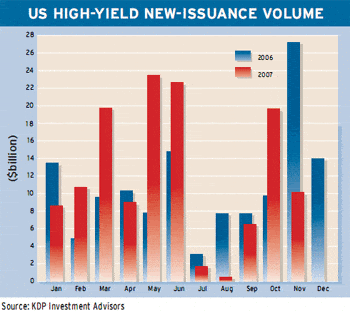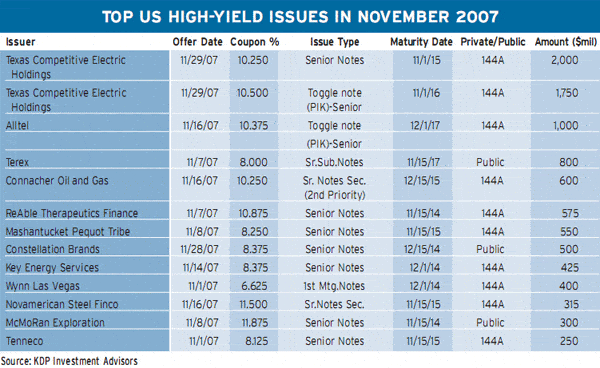CORPORATE DEBT
“An increasing number of corporates will need to finance or refinance acquisitions, share buybacks or just maturing debt and are likely to be forced to issue in 2008,” says Rob Orman, credit analyst at Royal Bank of Scotland in London.
Six months after the credit crunch began, corporations face the realization that liquidity is much more of a strategic priority than in the past, Orman says. With plenty of funding required and a diminishing number of places to go for money, corporate spreads over US treasuries look set to lurch wider in early 2008, he says.
 Bank spreads are the widest they have ever been, and banks will obviously not lend at rates below where they can finance themselves in the long term, Orman says. Meanwhile, the overhang in leveraged loans has been whittled down but remains substantial.
Bank spreads are the widest they have ever been, and banks will obviously not lend at rates below where they can finance themselves in the long term, Orman says. Meanwhile, the overhang in leveraged loans has been whittled down but remains substantial.
High-yield bond spreads in particular are expected to widen, but the worst of the liquidity crisis may be over by the end of the first quarter of 2008, when buyers may emerge for undervalued triple-A-rated corporate bonds and bank debt, according to Royal Bank of Scotland. It expects the European Central Bank to join the Federal Reserve in cutting interest rates this year to offset the tighter credit conditions.
European banks are facing the same constraints on lending as in the United States, and the high-yield bond market in Europe has been slower to recover. Melrose Resources, the British oil and gas exploration company, was forced by market conditions last November to postpone what would have been the first euro-denominated high-yield issue since the credit crunch began to bite last summer.
While the US high-yield bond market enjoyed a healthy new-issuance volume of nearly $20 billion in October, the total for November slumped to just over $10 billion, according to Montpelier, Vermont-based KDP Investment Advisors.
Texas Competitive Electric Holdings, a subsidiary of Dallas-based power producer TXU, returned to the high-yield bond market in November to place a total of $3.75 billion in two issues after issuing $7.5 billon in a three-part note offering in October. The proceeds will fund TXU’s leveraged buyout by a group led by Kohlberg Kravis Roberts and TPG.
Warren Buffett’s Berkshire Hathaway purchased a total of $2 billion of the second private placement of Texas Competitive’s bonds. It purchased $1.1 billion of 10.25% bonds at 95 cents on the dollar, for an effective yield of 11.2%. It also bought $1 billion of 10.5% payment-in-kind toggle bonds at 93 cents on the dollar, producing an effective yield of 11.8%.
European high-yield issuance reached a peak of about $70 billion in 2006 but all but stalled in the second half of 2007.

Gordon Platt



